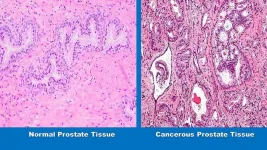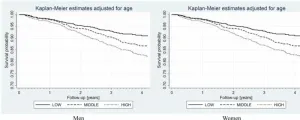(Press-News.org) In a peer-reviewed study believed to be the first of its kind published, a research team led by Johns Hopkins Medicine provides scientific evidence that a healthy diet may reduce the chance of low risk prostate cancer progressing to a more aggressive state in men undergoing active surveillance — a clinical option in which men with lower risk cancer are carefully monitored for progression in lieu of treatments that could have undesired side effects or complications.
The findings are reported today in the journal JAMA Oncology.
“Many men diagnosed with low grade prostate cancer are interested in changes they can make to reduce the risk of their tumor becoming more aggressive, and the role of diet and nutrition is one of the most commonly asked questions,” says study co-senior author Bruce Trock, Ph.D., a professor of urology, epidemiology and oncology at the Johns Hopkins University School of Medicine, and director of the Brady Urological Institute’s epidemiology division. “These men are motivated to make changes that may improve their prognosis, which is why we began collecting data on their diets, lifestyles and exposures 20 years ago. Hopefully, these latest findings will enable us to develop some concrete steps they can take to reduce the risk of cancer progression.”
When a patient is found after a biopsy to have developed prostate cancer, the sampled cells are assigned to a grade group based on how they look when compared with normal prostate tissue. Grade groups range from 1 to 5, with grade group 1 indicating indolent cancer cells that don’t look very different than normal tissue and do not metastasize (spread to other parts of the body).
At the other end of the scale, grade group 5 indicates cancer cells that are quite abnormal in appearance, and can grow and spread throughout the body if untreated. These grade groups are how clinicians classify the cancer’s biological aggressiveness.
During active surveillance, biopsies are performed at regular intervals in order to look for change in the prostate cancer that would move it to a higher grade group. This is called grade reclassification. Reclassification often leads to a recommendation for treatment. It also is a common way for researchers to evaluate the effectiveness of therapies and lifestyle modifications.
“While there have been previous research studies looking at diet and its relationship to prostate cancer, we believe that ours is the first to provide statistically significant evidence that a healthy diet is associated with a reduction in risk of prostate cancer progressing to a higher grade group, as shown by a reduction in the percentage of men on active surveillance experiencing grade reclassifications over time,” says study co-senior author Christian Pavlovich, M.D., a professor in urologic oncology at the Johns Hopkins University School of Medicine and director of the Brady Urological Institute’s prostate cancer active surveillance program.
In the newly published study, the researchers prospectively evaluated the histories of 886 men (median age at diagnosis: 66) diagnosed with grade group 1 prostate cancer from January 2005 to February 2017, all of whom were in the Johns Hopkins Medicine active surveillance program and whom, at the time of enrollment, completed a validated food frequency survey — the Block 1998 Food Frequency Questionnaire — regarding their usual dietary patterns. Of the participants, 55 were Black (6.2%), 803 (90.6%) were white and 28 (3.2%) identified as other races and ethnicities.
Based on their responses to the questionnaire, a Healthy Eating Index (HEI) score was calculated for each patient. The HEI ranges from 0 to 100.
“The HEI is a validated measure of overall diet quality, quantifying how well an individual’s dietary pattern adheres to the recommendations of the U.S. Department of Agriculture’s Dietary Guidelines for Americans,” says study lead author Zhuo Tony Su, M.D., a fifth-year resident at the Brady Urological Institute and the Johns Hopkins University School of Medicine. “We looked at each patient’s HEI score — as calculated from their dietary information recorded at enrollment in our active surveillance program — and assessed whether men with a higher quality diet were less likely to experience grade reclassification in the years afterward.”
Su says the researchers also evaluated the patients using an energy-adjusted HEI (E-HEI) score that takes into account a person’s daily caloric intake.
Along with those two metrics, Su says, the researchers calculated scores for each study participant using the Dietary Inflammatory Index (DII) and the energy-adjusted DII (E-DII).
“The DII and E-DII scores assess the inflammatory or anti-inflammatory potential of any diet, so higher scores indicate a diet that may cause more inflammation, which in turn, may contribute to the development and progression of prostate cancer,” says Su. “We evaluated whether higher inflammatory potential was associated with increased risk of grade reclassification.”
By a follow-up assessment at 6.5 years after diagnosis, 187 men (21%) had been reclassified as grade group 2 or greater, of whom 55 (6%) had extreme grade reclassification to grade group 3 or greater.
“When our team looked at the HEI and E-HEI scores in relation to the grade reclassification rates, we found a statistically significant inverse association between adherence to a high quality diet — as indicated by high HEI and E-HEI scores — and the risk of grade reclassification during active surveillance,” says Trock. “In other words, the higher the HEI and E-HEI scores, the more reduced the risk that a low grade prostate cancer had progressed to a higher grade disease that mandated curative treatment.”
Pavlovich says for patients adhering to a high quality diet, every increase of 12.5 points in the HEI score was associated with an approximately 15% reduction in reclassification to grade group 2 or greater, and a 30% reduction in reclassification to grade group 3 or greater.
The researchers say their findings also indicate that lower inflammation potential is among several possible risk lowering mechanisms as a result of a higher quality diet. However, they did not find an association between grade reclassification and baseline DII/E-DII scores.
“This lack of association with DII/E-DII may indicate that inflammation plays a role in driving the progression from a healthy prostate to one with cancer,” says Trock. “Whereas, in men who already have prostate cancer, the more subtle biological change from a lower to higher grade may reflect other mechanisms potentially influenced by diet.”
The researchers report several limitations in their study, including diet data based on patient self-reporting, results subject to potential nonresponse bias (bias occurring when respondents and nonrespondents differ in ways that impact the research, making the sample population less representative of the whole population) and not accounting for dietary changes over time. Additionally, they say the study population — consisting predominantly of white men with grade group 1 disease at diagnosis — may not be generalizable to all patients.
“Our findings-to-date should be helpful for the counseling of men who choose to pursue active surveillance and are motivated to modify their behaviors, including quality of diet,” says Pavlovich. “However, to truly validate the association between higher quality diet and reduced risk of prostate cancer progression, future studies with more diverse populations are needed.”
Along with Trock, Pavlovich and Su, research team members from Johns Hopkins Medicine are Patricia Landis and Mufaddal Mamawala, M.B.B.S., M.P.H.
Team members from other medical institutions are Claire de la Calle, M.D., from the University of Washington, and three researchers from the University of South Carolina: James Hebert, Sc.D., M.S.P.H.; Nitin Shivappa, Ph.D., M.B.B.S., M.P.H.; and Michael Wirth, Ph.D., M.S.P.H.
The work was supported by the Persky Family Foundation and the Patrick C. Walsh Prostate Cancer Research Fund.
Hebert reports controlling interest in Connecting Health Innovations, a company that has licensed the right to his invention of the Dietary Inflammatory Index from the University of South Carolina to develop computer and smartphone applications for patient counseling and dietary intervention in clinical settings. Su reports receiving a Persky scholarship and a Johns Hopkins urology intramural grant during conduct of this study. Trock reports receiving personal fees for consulting from Emmes and from Myriad Genetics, and grants from MDxHealth outside this study.
No other authors had disclosures to report.
END
Study suggests a healthy diet may help keep low grade prostate cancer from progressing to more dangerous states during active surveillance
Johns Hopkins Medicine-led research is believed to be the first to provide evidence of this association
2024-10-17
ELSE PRESS RELEASES FROM THIS DATE:
Center for Genomic Diagnostics receives first USDA grant
2024-10-17
Foreign animal diseases are a global threat to swine production with the potential for detrimental economic implications. Recently, researchers at the University of Illinois Urbana-Champaign received a three-year grant of $650,000 from the U.S. Department of Agriculture to develop sensitive, rapid, low-cost, and portable point-of-use biosensors to improve on-farm detection and surveillance of African swine fever virus.
ASFV is a large DNA virus that infects swine and can result in a lethal hemorrhagic fever, spread rapidly to neighboring pigs, and cause excessive morbidity ...
The National Tax Journal is pleased to announce the recipients of the 2024 Musgrave Prize and the 2024 Referee Award
2024-10-17
The National Tax Journal is pleased to announce the recipients of the 2024 Musgrave Prize and the 2024 Referee Award.
The Richard A. Musgrave Prize was created in 1999 and is presented each year to the author(s) of the best article published in the National Tax Journal. The award is a tribute to Richard Musgrave, whose work throughout his luminous career was characterized by a powerful blend of analytical clarity, insight drawn from the historical record, and respect for the importance of administrative issues. With this award, the National Tax Association recognizes his many contributions to public policy theory, research, and practice.
This year, ...
Study finds legalization didn’t increase recreational cannabis use among young adults in country of Georgia
2024-10-17
(Boston)—Cannabis is one of the most widely used drugs, with an estimated 219 million users globally in 2021, with the highest number of users in the Americas. It is also the most used drug among young people. In the U.S., cannabis use among young adults (age 19 to 22) reached a historically high level in 2021, with 42.6% reporting use in the past year.
Effects and impact of recreational cannabis legalization and decriminalization on societies is a topic of global relevance and increasing scientific interest. Despite a rapidly growing body of published evidence, findings remain mostly ...
A.J. Drexel Autism Institute study highlights key challenges and opportunities in transitioning autistic individuals into adulthood
2024-10-17
The Autism Transitions Research Project, funded by the Health Resources and Services Administration and led by Drexel University’s A.J. Drexel Autism Institute, has released new findings that underscore critical challenges and opportunities in transitioning autistic youth into adulthood. As approximately 1.2 million autistic individuals are expected to reach adulthood in the coming decade, these insights are vital for shaping future research and services.
The study, “Challenges and Opportunities in Transitioning Autistic Individuals into Adulthood,” led by Anne M. Roux, a research scientist and director at the Policy Impact Project in the ...
Measuring defects to better understand quantum systems
2024-10-17
Quantum defects have the potential to act as ultra-sensitive sensors that could offer new kinds of navigation or biological sensor technology.
One type of these defect systems, nitrogen vacancy (NV) centers in diamonds, can measure nanoscale magnetic fields. But while scientists can control the quantum spin of these centers — single defects in the diamond, where nitrogen has replaced the carbon — they still do not have a full understanding of how to best isolate that spin from the spins of other defects in the material, which can destroy its quantum state memory, ...
Repurposing drug shows promise in fighting aggressive brain tumours: uOttawa study
2024-10-17
Glioblastoma is the most common – and the most malignant – primary brain tumour in adults. It’s aggressive and incurable. Even with treatment including surgical removal and chemotherapy, the median survival for patients is just 18 months.
Now, innovative new research led by Dr. Arezu Jahani-Asl, Canada Research Chair in Neurobiology of Disease at the University of Ottawa, provides highly compelling evidence that a drug used to slow the progression of the disease ALS shows promise ...
New initiative to fuel neuroscience and aging research
2024-10-17
Demonstrating its commitment to excellence as a member of the Association of American Universities and number one in the state for National Institutes of Health (NIH) funding, the University of Miami has pledged to invest more than $30 million to bolster basic science research that will target neuroscience and aging, some of the most complex conditions confronting the United States population, including in South Florida.
The investment over the next five years will create a new program in ...
WashU researchers use genetics to find psychopathology risks
2024-10-17
When trying to understand how genetic influences factor into youth behavior, researchers at Washington University in St. Louis have taken the “big trawl” approach, casting their net wide to pull in all the measured traits, behaviors and environments that make up who we are and examine associations with the genetic building blocks comprising risk for mental health problems.
This cutting-edge methodology has turned up valuable new insights into factors related to psychopathological genetic risk, ...
Fibroblast growth factor 21 and survival in the elderly: Polsenior2 study results
2024-10-17
“Of note, participants with high serum levels of FGF21 more frequently had metabolic complications, such as hypertension, obesity, diabetes, hypercholesterolemia, and hypertriglyceridemia.”
BUFFALO, NY- October 17, 2024 – A new research paper was published in Aging (listed by MEDLINE/PubMed as "Aging (Albany NY)" and "Aging-US" by Web of Science), Volume 16, Issue 19 on September 18, 2024, entitled, “Fibroblast growth factor 21 inversely correlates with survival in elderly population – the results of the Polsenior2 study.”
As ...
Plankton balloon to six times their size in newly discovered mode of oceanic travel
2024-10-17
Many plankton journey from the cold, dark depths of our oceans to the surface, only to eventually drift down again into the darkness in a perpetual rhythm. Yet, how single-celled phytoplankton, most of which have no appendages to help them swim, make this pilgrimage has remained a mystery. In a paper publishing October 17 in the Cell Press journal Current Biology, researchers describe a species of bioluminescent phytoplankton, called Pyrocystis noctiluca, that balloons to six times their original size of a few hundred microns. This massive inflation allows the plankton to journey up to 200 meters toward the ocean’s surface to capture sunlight, then ...
LAST 30 PRESS RELEASES:
Why do we get a skip in our step when we’re happy? Thank dopamine
UC Irvine scientists uncover cellular mechanism behind muscle repair
Platform to map living brain noninvasively takes next big step
Stress-testing the Cascadia Subduction Zone reveals variability that could impact how earthquakes spread
We may be underestimating the true carbon cost of northern wildfires
Blood test predicts which bladder cancer patients may safely skip surgery
Kennesaw State's Vijay Anand honored as National Academy of Inventors Senior Member
Recovery from whaling reveals the role of age in Humpback reproduction
Can the canny tick help prevent disease like MS and cancer?
Newcomer children show lower rates of emergency department use for non‑urgent conditions, study finds
Cognitive and neuropsychiatric function in former American football players
From trash to climate tech: rubber gloves find new life as carbon capturers materials
A step towards needed treatments for hantaviruses in new molecular map
Boys are more motivated, while girls are more compassionate?
Study identifies opposing roles for IL6 and IL6R in long-term mortality
AI accurately spots medical disorder from privacy-conscious hand images
Transient Pauli blocking for broadband ultrafast optical switching
Political polarization can spur CO2 emissions, stymie climate action
Researchers develop new strategy for improving inverted perovskite solar cells
Yes! The role of YAP and CTGF as potential therapeutic targets for preventing severe liver disease
Pancreatic cancer may begin hiding from the immune system earlier than we thought
Robotic wing inspired by nature delivers leap in underwater stability
A clinical reveals that aniridia causes a progressive loss of corneal sensitivity
Fossil amber reveals the secret lives of Cretaceous ants
Predicting extreme rainfall through novel spatial modeling
The Lancet: First-ever in-utero stem cell therapy for fetal spina bifida repair is safe, study finds
Nanoplastics can interact with Salmonella to affect food safety, study shows
Eric Moore, M.D., elected to Mayo Clinic Board of Trustees
NYU named “research powerhouse” in new analysis
New polymer materials may offer breakthrough solution for hard-to-remove PFAS in water
[Press-News.org] Study suggests a healthy diet may help keep low grade prostate cancer from progressing to more dangerous states during active surveillanceJohns Hopkins Medicine-led research is believed to be the first to provide evidence of this association





